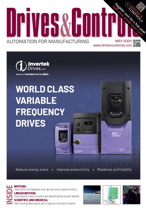Digitalisation will be applied to LV motor production

A group of four German companies and organisations, including Siemens and the Fraunhofer institute, have embarked on a 26-month project aimed at developing technologies, interfaces and infrastructures for implementing digital industrial production. At the end of the project, the partners plan to test the concepts on a line assembling low-voltage motors at a Siemens factory in Nuremberg.
‘New approach to automation’ uses robots to control cells

Rethink Robotics, the US company behind the Baxter and Sawyer collaborative robots, has developed a new software platform that, it says, can co-ordinate an entire work-cell from a single robot. A team of about 30 engineers has spent two years developing the Intera 5 platform, which reduces the need for conventional PLCs and for integration, allowing manufacturers to deploy automated work-cells in a matter of hours, rather than weeks.
UK technology will ‘revolutionise’ soft-starter market

A British soft-starter specialist has developed a new technology which, it believes, will revolutionise the global soft-starter market, which is predicted to be worth more than $1.6bn by 2020. Fairford Electronics’ patented technology allows two or more soft-starters to work together to control higher-power motors. It says that the technology, which it calls Fairford Pluss, will result in longer operating lives, cost savings and improved reliability for soft-starter applications.
PLC safety concept ‘can save $300,000 a year'

A new concept for safety PLCs can distinguish between a real reaction to a hazard – when the machine must stop – and those that trip a machine during non-critical events. Its developer, ABB, claims that it will cut downtime costs.
Holistic approach delivers predictive maintenance

At the recent SPS IPC Drives show in Germany, Mitsubishi Electric demonstrated a condition-monitoring technology for rotating machines that combines and interprets data from smart sensors to provide an overview of the health of assets across an entire plant. The Smart Condition Monitoring (SCM) system integrates the smart sensors with an intelligent controller for a more "holistic" approach to condition monitoring and predictive maintenance.
Safety technology will allow changes with no reprogramming

The Austrian company B&R Automation is working on a technology that, it says, will provide seamless safety for production lines. It will allow machines or individual components to be added or removed from a machine network without having to reprogram the safety application.
Siemens links with Microsoft on cloud-based IoT platform

At the recent SPS IPC Drives exhibition in Germany, Siemens announced plans to make its MindSphere Internet-of-Things ecosystem available on Microsoft's Azure cloud platform during 2017. MindSphere allows industrial enterprises to improve the efficiency of their plants by acquiring and analysing large amounts of production data.
Maintenance system ‘spots 99% of potential problems’

Bosch Rexroth has developed a predictive maintenance technology that, it claims, will detect 99% of potential issues, compared to 43% for experts using traditional condition-monitoring techniques. The technology, called ODiN, uses machine learning to generate knowledge about the health of equipment from sensor data, and to produce reliable predictions about likely times to failure.
Micro-compressor is ‘the first innovation for 100 years’

A Scottish company claims to have developed world’s smallest high-pressure, low-vibration clean-air compressor. Edinburgh-based Vert Rotors adds that its tiny device is the first real innovation in micro-compressor technology for a century.
Servomotor with built-in screw drive is ‘unique’

The German miniature servomotor specialist Wittenstein cyber motor has come up with a “unique” servomotor design which has a screw drive built into its housing. The motor, spindle drive, linear guide and encoder system form a ready-to-mount integrated linear actuator system suitable for use as a dynamic positioning axis, especially where space is limited. When combined with servo controls, the motors can form servo axes with multiple fieldbus interfaces.
Linear transfer system carries on-board power

Mitsubishi Electric is the latest automation supplier to announce a linear transfer system for production lines. It has teamed up with the German production technology specialist, APT Automation, to develop a system called Smart Carriage that “uniquely” provides 240V AC and 24VC supplies on board its carriages, which can be used to power sensors, grippers and actuators, and to collect and store data.
NASA's glass gears have cracking potential

US researchers, led by scientists and engineers from NASA’s Jet Propulsion Laboratory in California, are developing gears made out of special materials that that can act both as a metal and as a glass. The materials can operate efficiently without lubricants in extremely cold conditions, such as those found on the surface of planets and moons. They could also slash the cost of strain-wave gears used in applications such as robotics.
Open control platform supports your favourite tools

At the recent SPS IPC Drives show, Phoenix Contact unveiled a “future-proof” open control platform, called PLCnext, that will allow engineers from different disciplines to work together simultaneously on projects, each in their preferred development environments. They can continue to use their chosen programming tools – such as Visual Studio, Eclipse and Matlab Simulink – and to link their program code, saving time and reducing the risk of errors.
‘Basic’ 100Mbit version of CC-Link IE will cut costs

CLPA – the CC-Link Partner Association – has announced an addition to its CC-Link IE protocol that will allow device vendors to add CC-Link IE compatibility to any product with a 100Mbit Ethernet port. The new version, known as CC-Link IE Field Network Basic – or “Basic Mode” – can be implemented on devices or master controllers using software alone, allowing it to be added to existing products without making any hardware modifications. CLPA says that this will reduce the cost of development and time-to-market “significantly”.
Future enclosures will have built-in cooling 'like a fridge'

Ritttal used the recent SPS IPC Drives exhibition to preview its vision of the future where enclosures will have built-in cooling systems, avoiding the need to assemble cooling systems on enclosure roofs or side panels. It showed two prototypes: one with the cooling system at the top; the other at the side.




